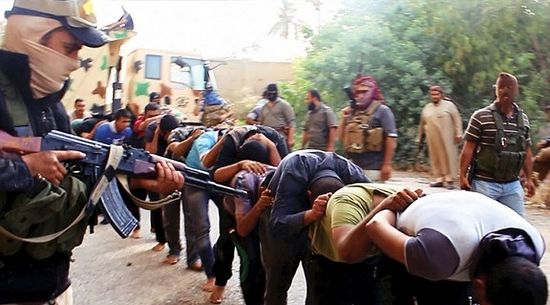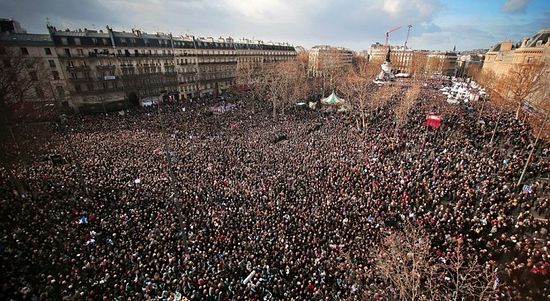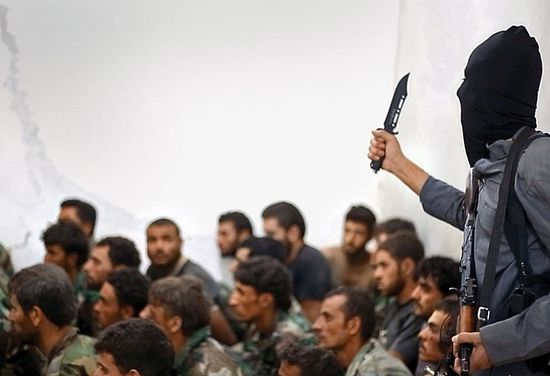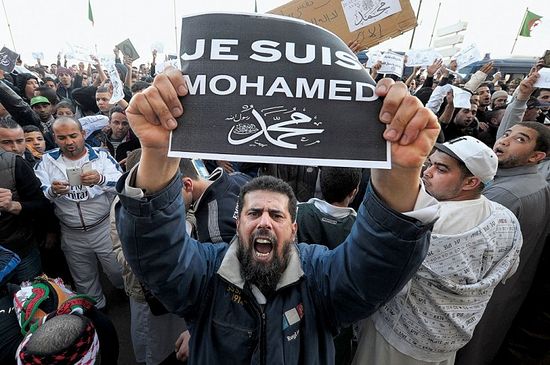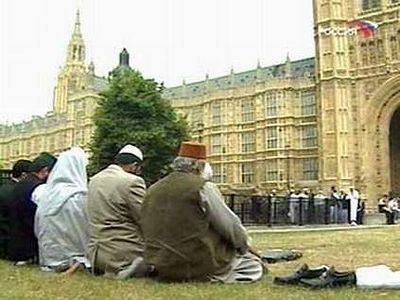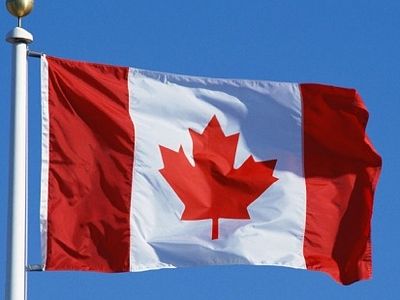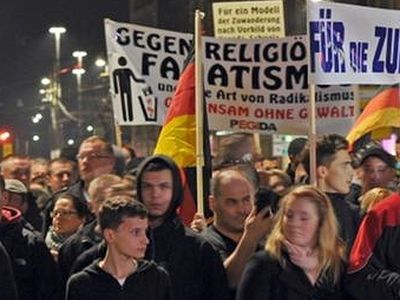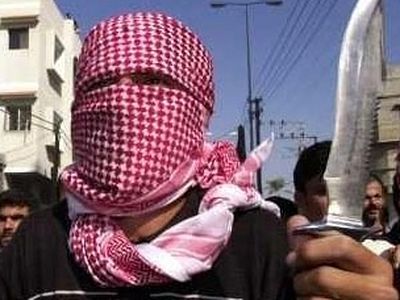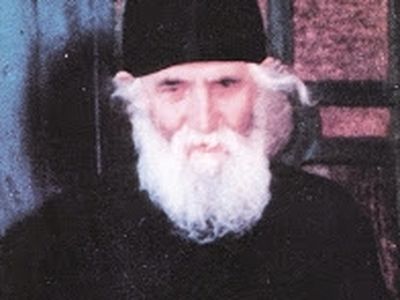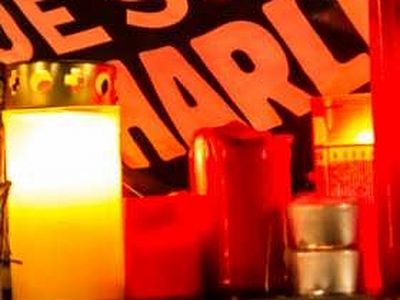Source: WORLD News Group
ISLAM | Across Europe, Africa, and the Middle East terrorist attacks unfolded seemingly simultaneously in January, a product of bigger, better-financed Islamic jihadists driven by a singular ideology. ‘The West is duly terrified. But it should not be surprised’.
On the evening before Islamist terrorists burst into the Paris offices of the satirical magazine Charlie Hebdo, an Egyptian Muslim slipped into a Coptic church in Cairo, surrounded by a cadre of armed men.
The unexpected outsider approached the altar of St. Mark’s Coptic Orthodox Cathedral and turned to face a crowd of stunned Christians. But this was no attacker: This was their president wishing them Merry Christmas.
For long-oppressed Christians in a predominantly Muslim nation, the visit was extraordinary. Indeed, President Abdel Fattah al-Sisi became the first Egyptian president to visit a Coptic Orthodox Church on Christmas Eve, celebrated by Eastern Orthodox Christians on Jan. 6.
At the same cathedral less than two years earlier, Muslim rioters attacked mourners leaving a funeral for four Christians killed in religious attacks on the outskirts of Cairo. Police fired tear gas as a mob laid siege to the church for hours, and one person died. Now a Muslim president was standing in the Coptic cathedral, expressing solidarity with marginalized Christians.
“Let no one say to you: ‘What kind of Egyptian are you?’” al-Sisi told the congregation. Many cheered. Some wept for joy.
It was a bright beginning to an agonizing week.
Within hours, masked terrorists stormed the offices of Charlie Hebdo, shouting “Allahu Akbar”—Arabic for “Allah is great”—and launched a Paris murder spree that left 17 people dead.
Meanwhile, a far deadlier terrorist attack was already underway.
Nearly 2,000 miles south, militants from the Islamist terror group Boko Haram unleashed a massive attack on more than a dozen villages and towns in northern Nigeria, including Baga, a city with a multinational military base.
Initial reports were stunning: Some local officials estimated 2,000 dead. Others believed hundreds died. Survivors described fleeing past bodies strewn through villages, as militants shot mostly women, children, and elderly villagers too slow to escape.
Survivors reported militants burning whole towns, with some villagers still inside their homes. One local official told BBC the town of Baga—once home to 10,000 people—is now “virtually non-existent.”
Humanitarian groups and journalists struggled to gain access to the war zone to confirm the number dead. The Nigerian government reported the death toll was about 150, but many remained skeptical of that estimate, given the military’s misreporting in the past.
Whatever the final count, the savagery appeared to surpass even Boko Haram’s severest brutality in its years-long campaign to conquer northern Nigeria and establish an Islamic caliphate.
Satellite images published by Amnesty International offered an aerial view of the destruction. The organization estimated more than 3,700 structures damaged or destroyed, and suspected a high death toll. The group called the attack “catastrophic.”
Meanwhile, other horrors unfolded: Witnesses said militants kidnapped some 300 women and girls as they fled the Nigerian attacks and imprisoned them in a school. Many feared the militants would force the girls into slavery.
Thousands of displaced villagers clamored for refuge in far-flung towns and neighboring countries. In Maiduguri, Boko Haram’s headquarters, militants strapped explosives to a girl perhaps 10 years old and detonated her in a crowded marketplace. A day later, assailants in Potiskum used two more little girls as suicide bombers.
Still, the eyes of the world remained on Paris. As world leaders marched arm-in-arm with millions of Parisians mourning the 17 slain victims in France, hundreds of abandoned corpses filled the streets and open spaces of northern Nigeria, with scant international attention.
Nigerian attorney Emmanuel Ogebe called the Baga attacks “terrorism on steroids,” and added: “The global silence is deafening on this burgeoning genocide. Paris is bad, but Paris is no Baga.”
Perhaps the African catastrophe drew less attention because the death toll wasn’t immediately clear, and Nigeria has endured Boko Haram terrorism for years: The group killed more than 10,000 people last year. Far fewer expected a jihadist incursion in the heart of Paris.
But like the terrorists in Paris—and other parts of the world—Boko Haram militants aren’t just a local threat. They’ve spilled across borders, striking villages in Cameroon and recruiting soldiers from Niger and Chad.
They also share a common ideology: Islamist militants from France to Nigeria to Iraq champion a strain of radical Islam driving terror threats all over the world, including the United States.
President Barack Obama doesn't speak of radical Islam, despite the clear declarations of Islamist terror groups. That’s a mistake, according to Sebastian Gorka of the Va.-based Marine Corps University. Gorka says discrediting the enemy’s message is critical to defeating them.
Some moderate Muslims, like Egyptian President al-Sisi, have scorned Islamic extremists, but the Obama administration hasn’t embraced that approach. Gorka says that’s because it “undermines their narrative that [terrorism] has nothing to do with Islam.”
FOR BOKO HARAM, terror has everything to do with Islam.
After militants kidnapped nearly 300 schoolgirls from Chibok village last April, the group’s leader declared: “This is what I know in Quran. This is a war against Christians and democracy and their constitution. Allah says we should finish them when we get them.”
Over the last decade, the jihadists have finished thousands of Christians, burning churches, killing residents, and driving villagers from their homes. Last August, the group’s leader declared Boko Haram had established a caliphate—similar to the strategy followed by Islamic State in Iraq and Syria—in the villages it conquered.
The recent mass attacks come ahead of presidential elections set for Feb. 14. Some election observers see the escalation as an attempt to destabilize the country and prevent the contests.
Nigeria’s president, Goodluck Jonathan, has vowed elections will go forward, though he faces sharp criticism over his ineffectiveness in battling the Boko Haram insurgency. Even after the recent attacks, the Christian president didn’t publicly acknowledge the carnage for nearly two weeks.
U.S. efforts to help find the missing Chibok girls faltered last year, as security experts worried Boko Haram had infiltrated the Nigerian military. Witnesses say soldiers often abandon their posts or fail to respond to Boko Haram attacks.
Meanwhile, Boko Haram isn’t the only group attacking Christians.
As recently as December, Fulani herdsmen from the largest Muslim tribe in northern Nigeria attacked predominantly Christian villages in the country’s northeast. Witnesses told Morning Star News the herdsmen killed 15 Christians and burned churches and homes in two states.
Local sources in Kaduna State have documented some of the recent carnage, particularly Fulani attacks on Christian communities last June and September. Beyond tallies of numbers dead and houses burned, locals have documented names and faces and glimpses into lives lost.
Parisians gather at the Place de la Republique for a march against terrorism in their city on Jan. 11.
In documents provided to WORLD, a spreadsheet includes the name, sex, age, occupation, church membership, and mode of death for dozens of victims in Kaduna State: There’s the 55-year-old carpenter shot twice in the head and chest. There’s a 35-year-old pastor’s wife shot below the ear. Here’s a 1-year-old girl shot in the stomach. There’s a 28-year-old bricklayer who was beheaded.
In some cases, postattack photos show bodies piled high, including the corpses of many women and children: A woman’s neck is slashed. A pastor’s body is burned. A child lies next to his severed hand.
It’s a brutal record of an ongoing reality for Christians in northern Nigeria, and the documents’ authors—whom WORLD agreed not to identify for security reasons—dedicated the report to the memory of the slain:
“We who are alive to mourn you all take comfort from the Bible that tells us that in heaven you are saying a prayer. This prayer, we your brethren left alive join you in saying: ‘How long, O Lord, holy and true; dost thou not judge and avenge our blood on them that dwell on the earth?’ (Revelation 6:10).”
The report also includes a note of hope: “May the Holy Spirit embolden us to follow Christ with renewed devotion and dedication, because no force shall destroy the church of God in Northern Nigeria.”
AS JIHADIST FORCES WREAKED HAVOC in Nigeria, Islamist gunmen stormed the offices of Charlie Hebdo in Paris. Within minutes, the terrorists laid waste to the magazine known for its satirical depictions of religious figures, including the Muslim prophet Muhammad.
During the noon attack on Jan. 7, the gunmen opened fire on staff members and shouted: “We have avenged the Prophet Muhammad.” The rampage left 12 people dead, including a police officer executed on a sidewalk nearby.
Two days later, another gunman attacked a Jewish grocery store in Paris, killing four victims. Authorities believe the suspected terrorist Amedy Coulibaly also killed a policewoman. The terror group Islamic State later released a video apparently calling Coulibaly, 32, “a soldier of the Caliphate.”
Meanwhile, police tracked the Charlie Hebdo suspects to a printing shop in Paris. Before dying in a shoot-out with police, the gunmen—brothers Chérif and Saïd Kouachi—told a local television station they acted on behalf of the terrorist organization al-Qaeda in Yemen.
For horrified Parisians, the City of Light plunged into darkness.
Millions of citizens poured into the streets, mourning the 17 dead in the city’s worst terrorist attack in decades. An international outpouring included world leaders marching through Paris, though top U.S. officials were conspicuously absent. Marchers hoisted signs declaring: “Je suis Charlie”—French for “I am Charlie” in a sign of solidarity with Western victims.
An Islamic State fighter armed with a knife and an automatic weapon stands next to captured Syrian army soldiers and officers in Raqqa, Syria.
In a Wall Street Journal column, Ayaan Hirsi Ali—an activist who escaped Islamist brutality in Somalia—wrote the attacks in Paris were deplorable, but also predictable given the radical ideology driving them. “The West is duly terrified,” she wrote. “But it should not be surprised.”
Though the brutality of radical jihadists isn’t surprising, the advance has been swift. Since the purported “Arab Spring” began four years ago—with high hopes and public support from democracy leaders including then-Secretary of State Hillary Clinton and President Obama—jihadist groups like the Islamic State and Boko Haram have executed not only terror but also conquest.
In Nigeria, one group estimates Boko Haram controls a chunk of the country the size of Belgium. In the Middle East, the Islamic State has gained territory the size of the United Kingdom, according to counterterrorism expert Matthew Olsen. Over the summer, Islamic State terrorists drove entire Christian populations from their ancient homelands in Iraq, and continue to (see "Medical emergency" in this issue).
In places like Europe, Islamists haven’t gained territory, but they have gained momentum. The Paris attacks grew from a network of support reaching back to the Middle East (see "Connecting the plots" in this issue). One week later, authorities in Belgium raided a jihadist group planning imminent attacks on police.
A demonstrator holds up a “Je suis Mohamed” sign during a protest in Algiers, Algeria, on Jan. 16.
After the Paris attacks, French President François Hollande called the killing spree a terrorist act of “extreme barbarity.” French Prime Minister Manuel Valls declared his country “at war with terrorism, jihadism, and radical Islam.”
President Barack Obama called the attacks “cowardly and evil,” but avoided mentioning the strain of radical Islam driving the deadly threats against countries around the world.
In a later statement, the president said the terrorists “fear” freedom of speech and press. But according to a radical Muslim cleric writing in USA Today after the Paris attacks, jihadists don’t fear free speech, they violently oppose it.
“Muslims do not believe in freedom of expression, as their speech and actions are determined by divine revelation and not based on people’s desires,” wrote Anjem Choudary.
The cleric—who once vowed the Islamic State flag will fly over the White House—also explained why insulting Muhammad is a capital crime under Sharia law: “This is because the Messenger Muhammad said, ‘Whoever insults a Prophet kills him.’”
Identifying the threat of radical Islam is more than a matter of semantics; it’s a matter of strategy. Hirsi Ali, the Somali-born activist, writes: “If we take the position that we are dealing with a handful of murderous thugs with no connection to what they so vocally claim, then we are not answering them. … The more we self-censor … the bolder the enemy gets.”
IN PARIS, many citizens were still grappling with questions about the new reality in their home country.
Though Parisians defiantly marched through the city’s streets and denounced the jihadist attacks, the city’s Jewish population was particularly shaken. After the attack on a Jewish grocery store left four dead, some Jews openly wondered if Israel might be a safer home.
It’s too early to predict whether the attacks will cause some French citizens to leave the country, but the rampage has already left a deep wound in a spiritually needy nation. (Operation World estimates evangelicals comprise about 1 percent of the population in the heavily secularized country.)
In a Jewish neighborhood near the grocery story assault, the Paris branch of the organization Jews for Jesus put a sign in the window quoting Jesus’ words: “Peace I leave with you, My peace I give you, not as the world gives do I give to you. Do not let your heart be troubled, nor let it be fearful.”
Karl deSouza, a staff member at the Paris branch, wrote about his prayers with his family at home after the attacks:
“We prayed for the family members who died in the attack, we prayed for this country in mourning, we prayed for justice, and we also prayed that those who planned and orchestrated this massacre would stop what they are doing, turn to Messiah Jesus, for a true change in their hearts, and do what is right.
“It will never be a religion or ideology that changes the world, but through the One who came to set things right. And that change begins in us, his image-bearers.”
Timeline of events
Jan. 3 | Boko Haram fighters attack a multinational joint task force command post in Baga, driving out its forces, and launch a rampage on villages and towns in the surrounding area of Borno State in northern Nigeria.
Jan. 6 | Egyptian President Abdel Fattah al-Sisi makes a surprise visit to St. Mark’s Coptic Orthodox Cathedral during its Christmas Eve service—the first Egyptian president to do so.
Jan. 7 | At 11:30 a.m. local time gunmen Chérif and Saïd Kouachi enter the offices of satire magazine Charlie Hebdo, killing leading cartoonists and editors along with a policeman. Hijacking a car in the middle of the day in the city, they tell the ousted driver, “If the media ask you anything, tell them it’s al-Qaeda in Yemen.” By evening a million Parisians gathered in city streets with “Je suis Charlie” placards.
Jan. 7 | Boko Haram attacks in Baga again. Early reports suggest 2,000 men, women, and children may have been killed. At least 10,000 residents flee the area, some drowning in Lake Chad and others escaping across the border to Chad. Baga “is virtually non-existent,” said an eyewitness.
Jan. 8 | A 25-year-old French policewoman is shot dead in Paris by a gunman connected to the Kouachi brothers, later identified as Amedy Coulibaly.
Jan. 9 | In a dawn-to-dusk siege at a printing complex on the Paris outskirts, the Kouachis are cornered and eventually killed. Meanwhile, Coulibaly takes shoppers and clerks hostage in a kosher grocery story, killing four and wounding four before he is killed in a police assault.
Jan. 9 | Calling his actions “barbaric,” a federal judge in New York sentences Abu Hamza, the Finsbury Park Mosque cleric, to life in prison for terrorist activities, including a plot to kidnap Westerners in Yemen and set up a terrorist training camp in Oregon. A Hamza disciple recruited Chérif Kouachi for al-Qaeda.
Jan. 11 | Militants strap explosives to child suicide bombers and explode them in two marketplaces in northern Nigeria, killing three in one incident and 16 in another, with many wounded.
Jan. 11 | More than 1.5 million people march in Paris to protest attacks, including four prominent heads of state, but no top U.S. officials.
Jan. 12 | France deploys 10,000 troops to protect Jewish and other sites.
Jan. 12 | Islamic State claims to have abducted 21 Egyptian Christians in Libya, and publishes a photo of them in captivity.
Jan. 15 | Satellite images released by Amnesty International show over 3,700 structures damaged or completely destroyed in Baga and nearby villages in the Boko Haram rampage.
Jan. 15 | Belgian authorities raid a suspected terror cell in Verviers, killing two suspects and thwarting what they say were plots for more European attacks.
